January
A new year at Qatar Foundation meant new opportunities for learning, innovation, discovery, and collaboration – within a landscape of knowledge that has no global parallel.
Progressive Education
Impact Through InnovationQatar Foundation’s (QF) own ecosystem of knowledge is testament to its belief in educational innovation. It aims to reimagine what learning can be, and mean – and support those who want to do the same.
And as 2023 began, this belief was demonstrated by the winners of Qatar Spotlight – a joint initiative between QF and HundrED, a not-for-profit organization that identifies and shares innovations in K-12 education – being unveiled.
The ceremony at QF’s Education City saw 10 innovations capable of being scaled up around the world and making an impact on pre-university education receive Qatar Spotlight awards, among them a specially-crafted program that aims to guide and inspire students to be the ethical leaders of tomorrow.
Through the Ethics Curriculum at Qatar Academy Al Wakra – part of QF’s Pre-University Education – young learners from pre-school to Grade 12 are supported to make informed ethical decisions that help them become drivers of positive change in their societies.
Qatar Foundation’s (QF) own ecosystem of knowledge is testament to its belief in educational innovation. It aims to reimagine what learning can be, and mean – and support those who want to do the same.
And as 2023 began, this belief was demonstrated by the winners of Qatar Spotlight – a joint initiative between QF and HundrED, a not-for-profit organization that identifies and shares innovations in K-12 education – being unveiled.
The ceremony at QF’s Education City saw 10 innovations capable of being scaled up around the world and making an impact on pre-university education receive Qatar Spotlight awards, among them a specially-crafted program that aims to guide and inspire students to be the ethical leaders of tomorrow.
Through the Ethics Curriculum at Qatar Academy Al Wakra – part of QF’s Pre-University Education – young learners from pre-school to Grade 12 are supported to make informed ethical decisions that help them become drivers of positive change in their societies.
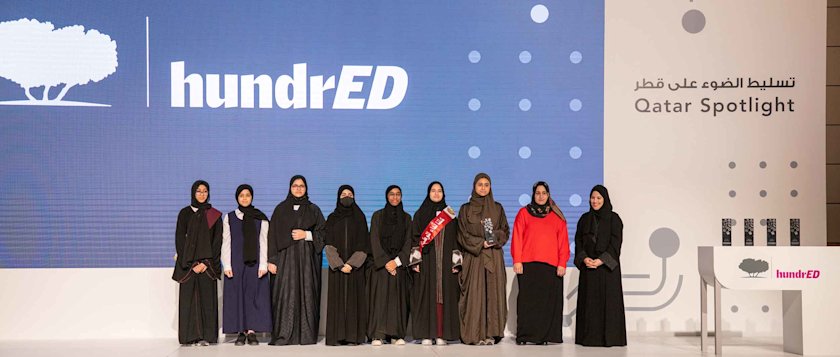
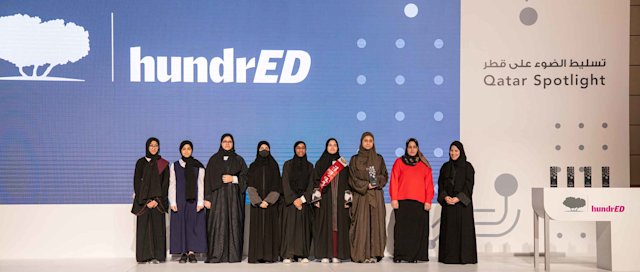
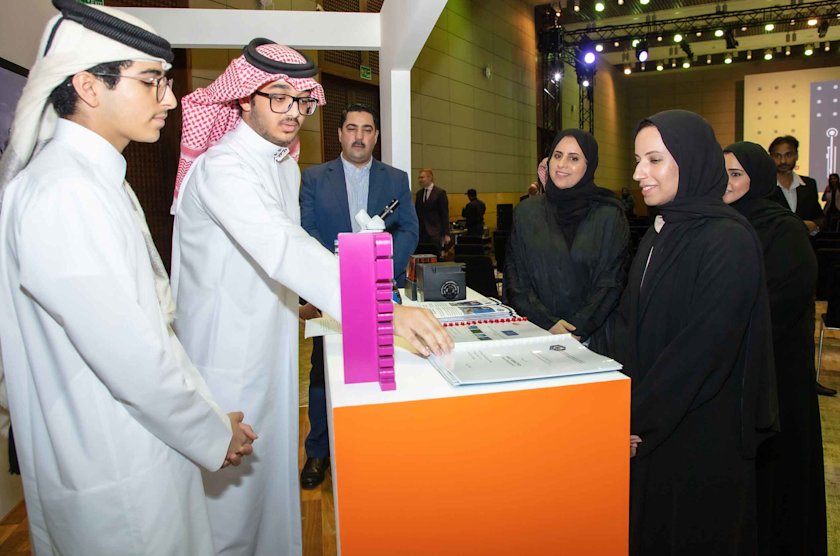
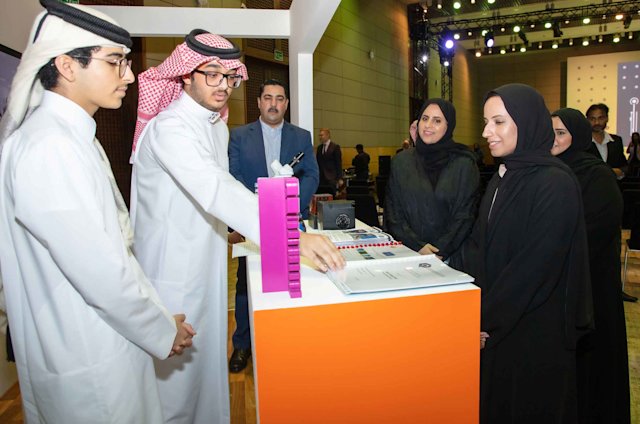
I feel pride and happiness in the innovation of students and teachers that contribute to making education an enjoyable and attractive experience, and instill the value of research and exploration among our students.
The 10 winning Qatar Spotlight projects were:
- Qatar Science & Technology Secondary School for Boys’ biotechnology and biomedical engineering program
- Qatar Academy Al Wakra’s Ethics Curriculum
- Al Faisal Without Borders Foundation’s Farm Your Country program
- Tariq Bin Ziad School’s Glocalization initiative
- Sherborne Qatar Preparatory School’s Museum in Residence project
- Zainab Preparatory School for Girls’ My Friend Robot project
- Academyati’s Quests initiative
- Qatar Academy Sidra’s Science and Sustainability Club project
- Qatar National Library’s Science Book Forum project
- Juwayriyah bint Al-Harith Primary School for Girls’ Virtual Learning Resources project
Progressive Education
Art Opens EyesLearning experiences with art at their heart were opened up for students across Qatar in 2023 – at a landmark art installation within QF’s Education City.
Opened in 2019, Seeroo fi al ardh is the final artwork of the late, renowned Indian artist Maqbool Fida Husain, which pays tribute to humanity’s spirit of innovation through an experience that comprises crystal glass horses, the Flying Man sculpture of Abbas ibn Firnas, a bronze replica of Leonardo da Vinci’s Flying Machine, vintage cars, and a vibrant mosaic, on a carousel synchronized to music.
And with Seeroo fi al ardh now embedded within the educational curriculum in Qatar, visits by school students and teachers allowed them to see how it can act as a learning tool, with its message about humankind being incorporated into lessons and teaching plans.
Among those visiting was Tracy Worner, Head of GEMS American Academy Qatar’s Drama Department, who said: “Students need to be exposed to as many creative experiences as possible – it inspires them and expands their minds.”
Learning experiences with art at their heart were opened up for students across Qatar in 2023 – at a landmark art installation within QF’s Education City.
Opened in 2019, Seeroo fi al ardh is the final artwork of the late, renowned Indian artist Maqbool Fida Husain, which pays tribute to humanity’s spirit of innovation through an experience that comprises crystal glass horses, the Flying Man sculpture of Abbas ibn Firnas, a bronze replica of Leonardo da Vinci’s Flying Machine, vintage cars, and a vibrant mosaic, on a carousel synchronized to music.
And with Seeroo fi al ardh now embedded within the educational curriculum in Qatar, visits by school students and teachers allowed them to see how it can act as a learning tool, with its message about humankind being incorporated into lessons and teaching plans.
Among those visiting was Tracy Worner, Head of GEMS American Academy Qatar’s Drama Department, who said: “Students need to be exposed to as many creative experiences as possible – it inspires them and expands their minds.”
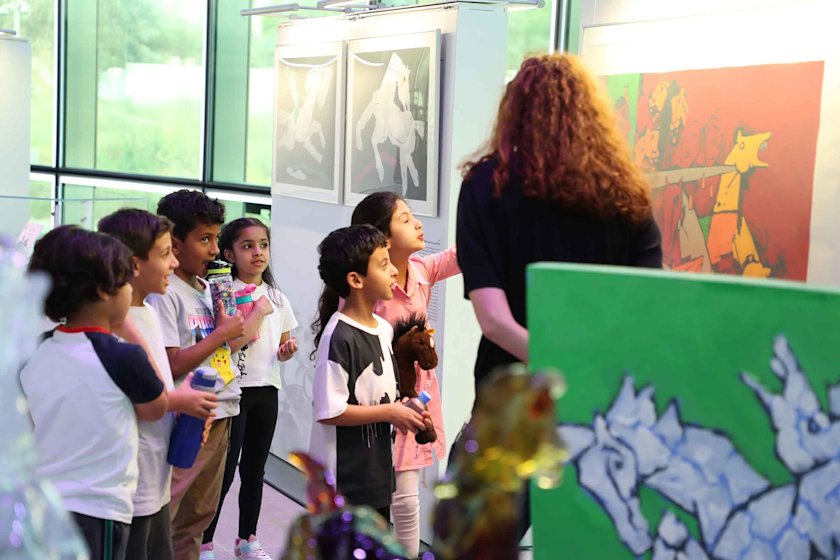
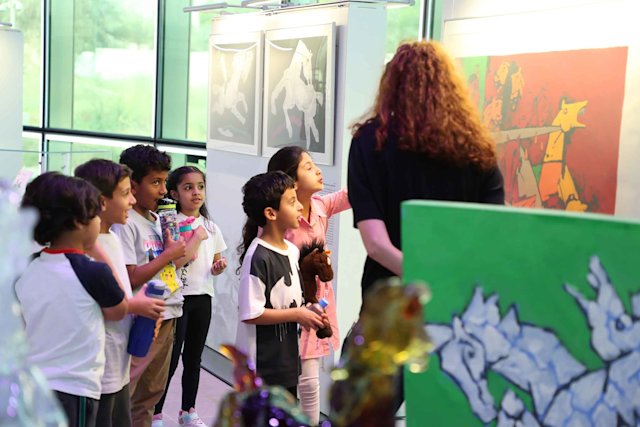
Arts, and arts education skills, can carry over into all other academic subjects, and into life outside the classroom.
Social Progress
The Power of DebateAcross the region, a culture of debate and discourse is spreading – and, as January once again proved, QF is at the forefront of it.
Close connections between QatarDebate – founded by QF to nurture freedom of thought and open discourse among youth in, and beyond, Qatar – and the Oman Debate team led to the Oman Debate Centre being opened in 2020.
And January witnessed a milestone for the Muscat center, and the regional debating landscape, as it hosted the second Asian Arabic Debate Championship. Organized by QatarDebate together with its Omani counterpart and Oman’s Ministry of Culture, Sports, and Youth, it saw the best debating teams from across Asia compete, with students from QF partner university Texas A&M University at Qatar emerging as the winners.
“The dedicated training and development opportunities offered by QatarDebate have been instrumental in their success as university students and top-tier debaters,” said Abdulrahman Al Subaei, Outreach Programs Manager, QatarDebate.
Across the region, a culture of debate and discourse is spreading – and, as January once again proved, QF is at the forefront of it.
Close connections between QatarDebate – founded by QF to nurture freedom of thought and open discourse among youth in, and beyond, Qatar – and the Oman Debate team led to the Oman Debate Centre being opened in 2020.
And January witnessed a milestone for the Muscat center, and the regional debating landscape, as it hosted the second Asian Arabic Debate Championship. Organized by QatarDebate together with its Omani counterpart and Oman’s Ministry of Culture, Sports, and Youth, it saw the best debating teams from across Asia compete, with students from QF partner university Texas A&M University at Qatar emerging as the winners.
“The dedicated training and development opportunities offered by QatarDebate have been instrumental in their success as university students and top-tier debaters,” said Abdulrahman Al Subaei, Outreach Programs Manager, QatarDebate.
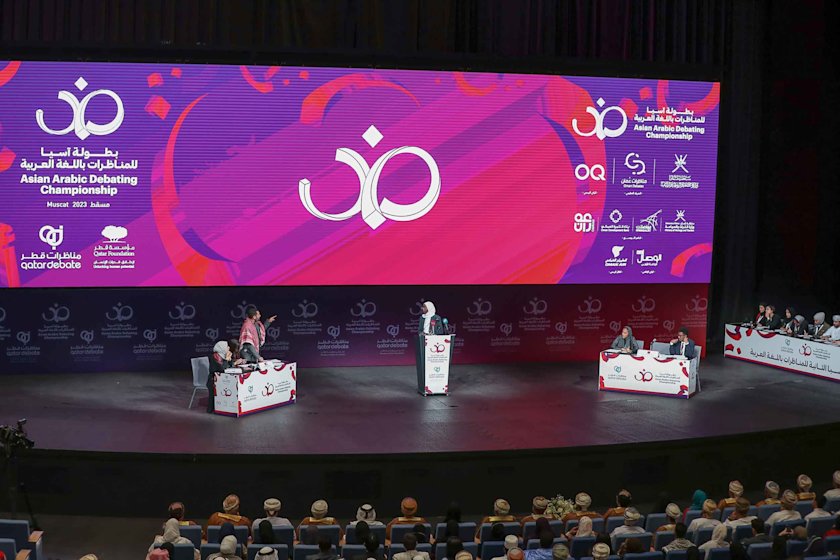
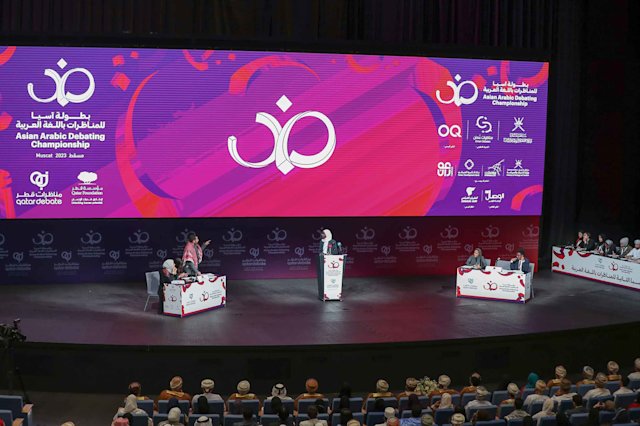

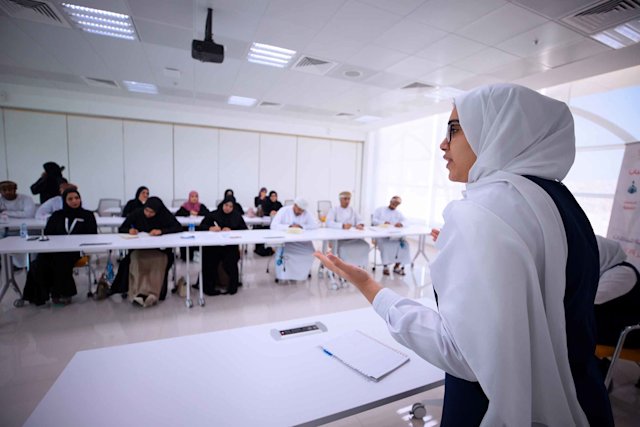
We hope the championship will contribute to reinforcing the culture of dialogue and debate among youth in Oman, and that it will also strengthen our relationship with QatarDebate to work on joint projects in the future.
Artificial Intelligence
Strengthening a Spiritual JourneyAn edtech platform that uses Artificial Intelligence (AI) and social networking technologies to engage children in prayer was among the innovations to secure funding that can help take it to the next level – thanks to QF’s Hamad Bin Khalifa University (HBKU).
The university’s Innovation Center awarded five projects QAR100,000 as the first winners of its Entrepreneurship Program Fund, supporting innovations that also included an AI-based application to help cancer treatment centers address booking, scheduling, and workload issues; a revolutionary solar technology; a tool supporting sustainable food supply; and an online trading platform for green energy trading.
“It’s fundamentally important to employ the best of what AI has to offer in strengthening our youth’s spiritual journey,” said Dr. David Yang, Associate Professor at HBKU’s College of Science and Engineering, whose interactive ISalati platform was awarded funding.
An edtech platform that uses Artificial Intelligence (AI) and social networking technologies to engage children in prayer was among the innovations to secure funding that can help take it to the next level – thanks to QF’s Hamad Bin Khalifa University (HBKU).
The university’s Innovation Center awarded five projects QAR100,000 as the first winners of its Entrepreneurship Program Fund, supporting innovations that also included an AI-based application to help cancer treatment centers address booking, scheduling, and workload issues; a revolutionary solar technology; a tool supporting sustainable food supply; and an online trading platform for green energy trading.
“It’s fundamentally important to employ the best of what AI has to offer in strengthening our youth’s spiritual journey,” said Dr. David Yang, Associate Professor at HBKU’s College of Science and Engineering, whose interactive ISalati platform was awarded funding.
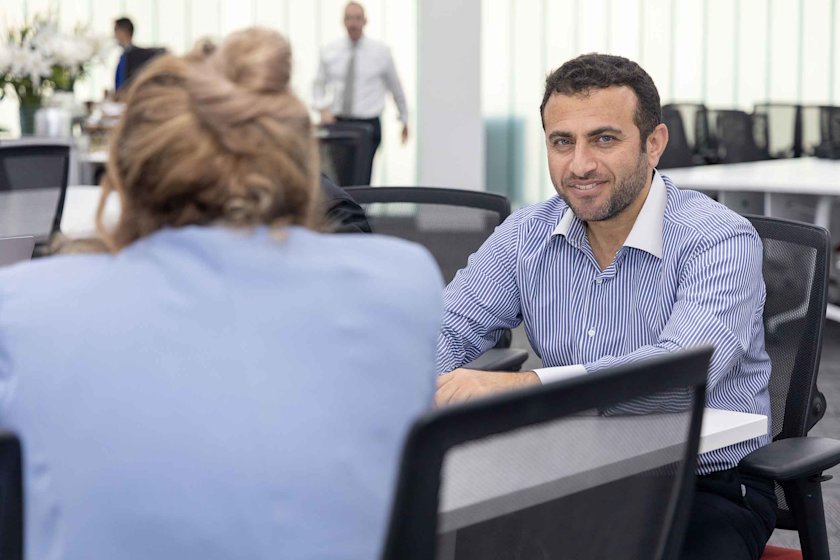

It’s an honor to have been chosen for the award, and we look forward to collaborating with our industry partners to see it through.
Progressive Education, Sustainability
Expertise on DisplayNew regional ground was broken for spoken language technologies in January, as students from around the world participated in the first hackathon in this field to be staged in the Middle East and North Africa – collaborating to devise ways of using technology to increase language understanding.
It formed part of the 2022 IEEE Spoken Language Technology Workshop, held in the region for the first time with HBKU’s Qatar Computing Research Institute as the host, with global experts discussing advances in areas including automated speech recognition, machine learning for languages, and text-to-speech applications.
Meanwhile, QF-generated expertise in solar energy was showcased by HBKU’s Qatar Environment and Energy Research Institute at the 8th World Conference on Photovoltaic Energy Conversion, the world’s biggest platform for photovoltaic research and development.
And Haya Al Ansari, a second-year medical student at QF partner university Weill Cornell Medicine-Qatar, presented research into a rare and incurable blood cancer, which she worked on with doctors from New York, at a leading US health conference focused on hematology.
New regional ground was broken for spoken language technologies in January, as students from around the world participated in the first hackathon in this field to be staged in the Middle East and North Africa – collaborating to devise ways of using technology to increase language understanding.
It formed part of the 2022 IEEE Spoken Language Technology Workshop, held in the region for the first time with HBKU’s Qatar Computing Research Institute as the host, with global experts discussing advances in areas including automated speech recognition, machine learning for languages, and text-to-speech applications.
Meanwhile, QF-generated expertise in solar energy was showcased by HBKU’s Qatar Environment and Energy Research Institute at the 8th World Conference on Photovoltaic Energy Conversion, the world’s biggest platform for photovoltaic research and development.
And Haya Al Ansari, a second-year medical student at QF partner university Weill Cornell Medicine-Qatar, presented research into a rare and incurable blood cancer, which she worked on with doctors from New York, at a leading US health conference focused on hematology.
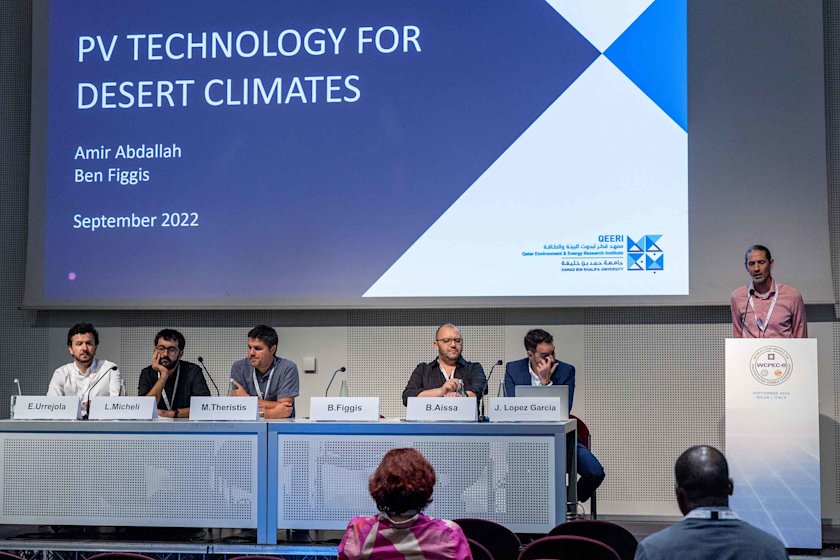
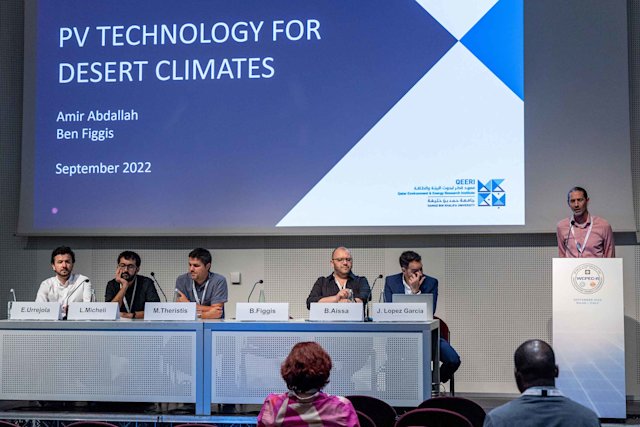
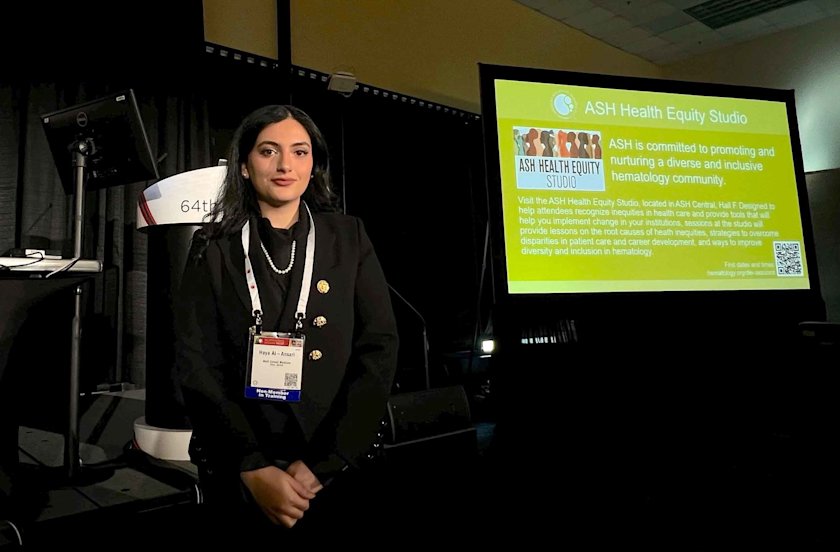
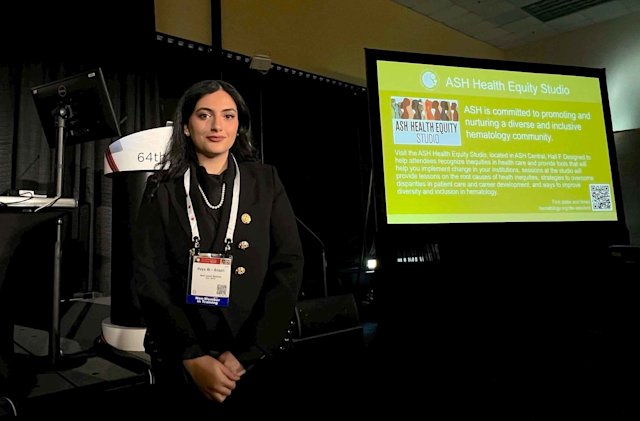
Artificial Intelligence
Healthy CollaborationWays of deploying AI and machine learning in healthcare were explored through a collaboration between QF partner university Virginia Commonwealth University School of the Arts in Qatar (VCUarts Qatar) and Qatar University.
The universities joined forces to investigate how machine learning algorithms and AI regimes can be used to improve health, with VCUarts Qatar’s Mathematical Data Science Lab working with QU researchers to develop a model allowing studies in this area to be carried out.
And fellow QF partner university HEC Paris in Qatar was also collaborating, as it entered an agreement with Qatar’s Ministry of Communications and Information Technology which will contribute to advancing the country’s digital transformation.
“This is an important step on the way to benefiting from HEC Paris’ great experience and clear interest in supporting Qatar’s digital and technology industry agenda,” said Her Excellency Reem Mohammed Al Mansoori, the ministry’s Assistant Undersecretary of Digital Society Development.
Ways of deploying AI and machine learning in healthcare were explored through a collaboration between QF partner university Virginia Commonwealth University School of the Arts in Qatar (VCUarts Qatar) and Qatar University.
The universities joined forces to investigate how machine learning algorithms and AI regimes can be used to improve health, with VCUarts Qatar’s Mathematical Data Science Lab working with QU researchers to develop a model allowing studies in this area to be carried out.
And fellow QF partner university HEC Paris in Qatar was also collaborating, as it entered an agreement with Qatar’s Ministry of Communications and Information Technology which will contribute to advancing the country’s digital transformation.
“This is an important step on the way to benefiting from HEC Paris’ great experience and clear interest in supporting Qatar’s digital and technology industry agenda,” said Her Excellency Reem Mohammed Al Mansoori, the ministry’s Assistant Undersecretary of Digital Society Development.
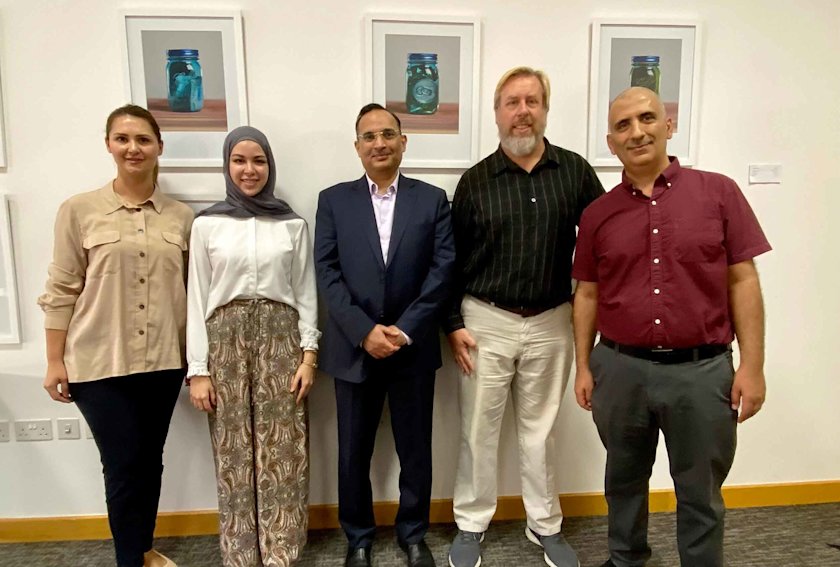
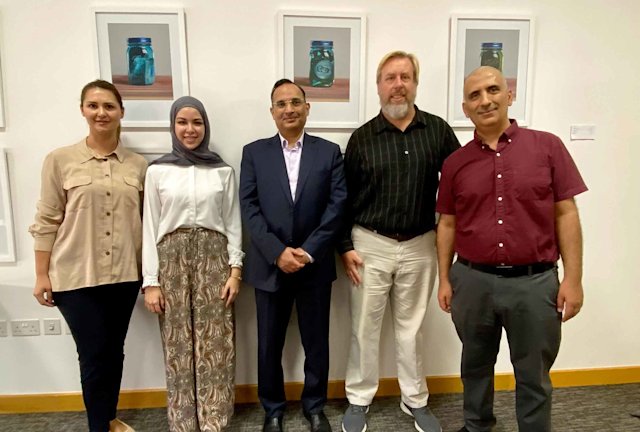
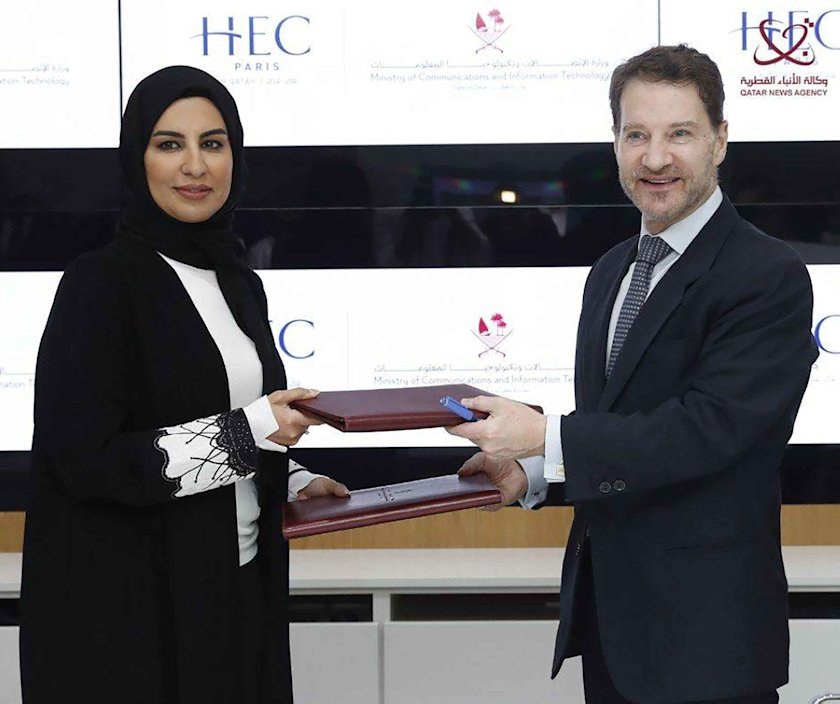
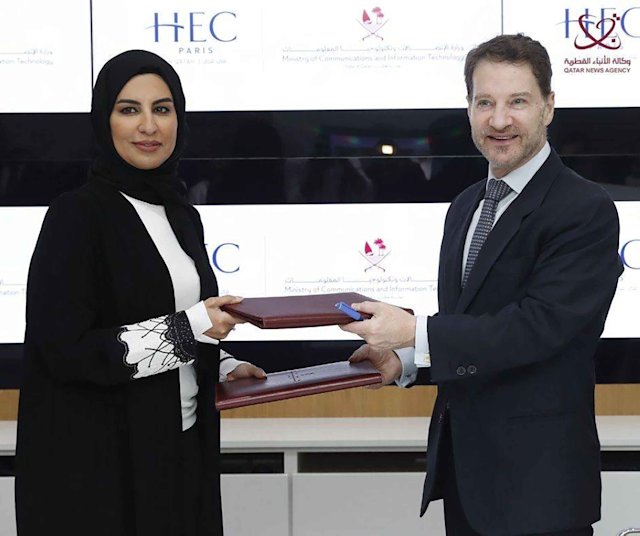
Sustainability
Food for ThoughtSupporting Qatar’s focus on strengthening its food security, researchers from a QF partner university embarked on a project connecting academia and industry, with the aim of increasing the nation’s tomato stocks by 25 per cent.
The hydroponic tomato project is a joint effort between Texas A&M University at Qatar (TAMUQ), the university’s parent campus, and Qatari food company Agrico. Its research team are studying tomato genotypes from around the world to assess which can best thrive in Qatar’s desert conditions, as well as the impact of a horticultural technique known as ‘grafting’, pest control, plant density, and pollination.
“As researchers, we strive to provide solutions to real challenges faced by the country,” said Dr. Bing Guo, a mechanical engineering associate professor at TAMUQ.
“In recent years, there has been a pressing need to make farming more efficient in Qatar. Our preliminary experimental results show a significant increase of tomato yield compared to the current practice, and this is a strong indication we will reach our goal.”
Supporting Qatar’s focus on strengthening its food security, researchers from a QF partner university embarked on a project connecting academia and industry, with the aim of increasing the nation’s tomato stocks by 25 per cent.
The hydroponic tomato project is a joint effort between Texas A&M University at Qatar (TAMUQ), the university’s parent campus, and Qatari food company Agrico. Its research team are studying tomato genotypes from around the world to assess which can best thrive in Qatar’s desert conditions, as well as the impact of a horticultural technique known as ‘grafting’, pest control, plant density, and pollination.
“As researchers, we strive to provide solutions to real challenges faced by the country,” said Dr. Bing Guo, a mechanical engineering associate professor at TAMUQ.
“In recent years, there has been a pressing need to make farming more efficient in Qatar. Our preliminary experimental results show a significant increase of tomato yield compared to the current practice, and this is a strong indication we will reach our goal.”
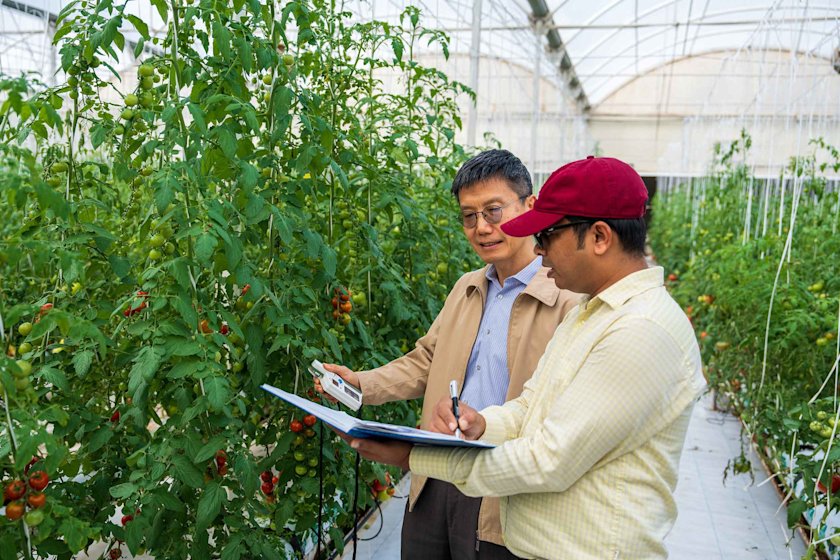
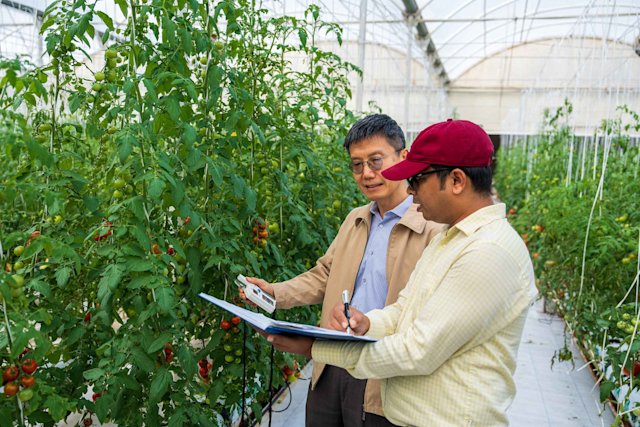
Research and development in agriculture play a key role in enhancing agricultural practices globally, and we look forward to working with Texas A&M researchers to produce the best for our country.
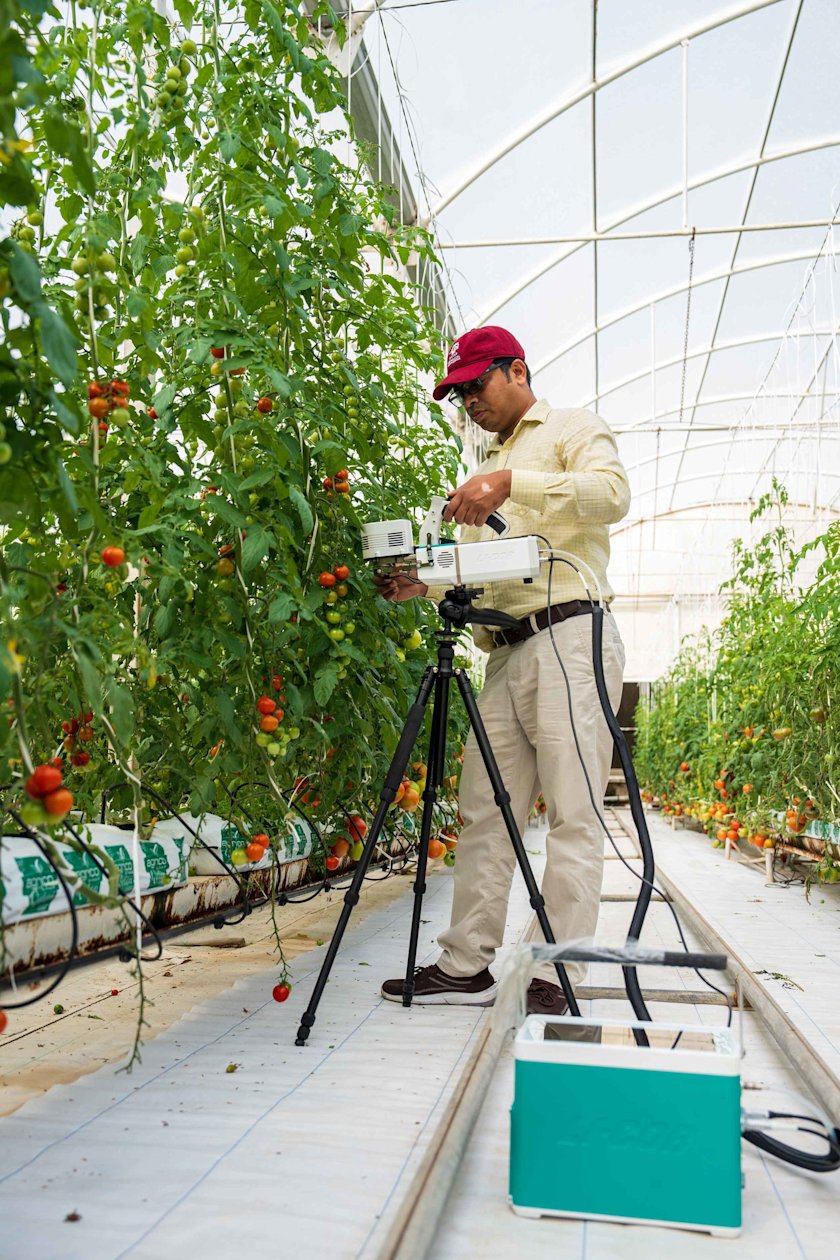
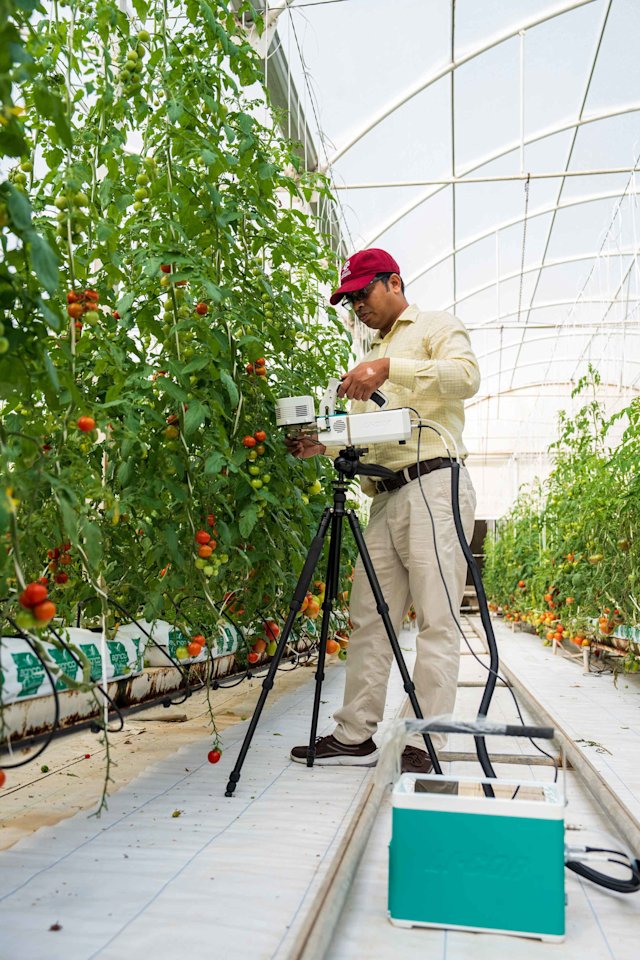
Progressive Education
Advocating for the Arabic LanguageHelping learners and teachers to navigate the Arabic language was the purpose of a new book published by a QF professor in January – promoting a concept which he believes can help protect the language for future generations.
‘Spoken Arabic: The Third Language’, by QF partner university Georgetown University in Qatar assistant professor Dr. Abdul Rahman Chamseddine, advocates for linguistic theories that apply certain colloquial forms of the language to classical Arabic, making it easier to speak; and provides a practical guide to using this “third language” for native and non-native Arabic speakers.
And QF partner university Northwestern University in Qatar was awarded a $350,000 grant by the Carnegie Corporation of New York to expand its Arab Information and Media Studies field and launch a research initiative focusing on the impact of the emerging world order on the Arab world and Global South.
“Our project has a triple distinction,” said Northwestern Qatar dean and CEO Marwan M Kraidy. “It is hosted at Northwestern, a global leader in communication, journalism, the social sciences, and the humanities. It is located in the Arab region. And it is explicitly trilingual, reflecting the rich pan-Arab diversity of research languages and tradition.”
Helping learners and teachers to navigate the Arabic language was the purpose of a new book published by a QF professor in January – promoting a concept which he believes can help protect the language for future generations.
‘Spoken Arabic: The Third Language’, by QF partner university Georgetown University in Qatar assistant professor Dr. Abdul Rahman Chamseddine, advocates for linguistic theories that apply certain colloquial forms of the language to classical Arabic, making it easier to speak; and provides a practical guide to using this “third language” for native and non-native Arabic speakers.
And QF partner university Northwestern University in Qatar was awarded a $350,000 grant by the Carnegie Corporation of New York to expand its Arab Information and Media Studies field and launch a research initiative focusing on the impact of the emerging world order on the Arab world and Global South.
“Our project has a triple distinction,” said Northwestern Qatar dean and CEO Marwan M Kraidy. “It is hosted at Northwestern, a global leader in communication, journalism, the social sciences, and the humanities. It is located in the Arab region. And it is explicitly trilingual, reflecting the rich pan-Arab diversity of research languages and tradition.”
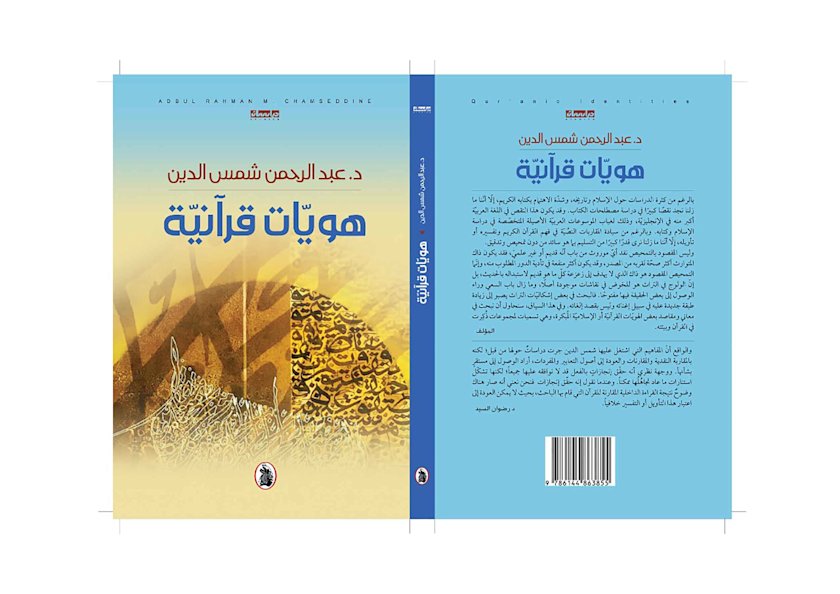
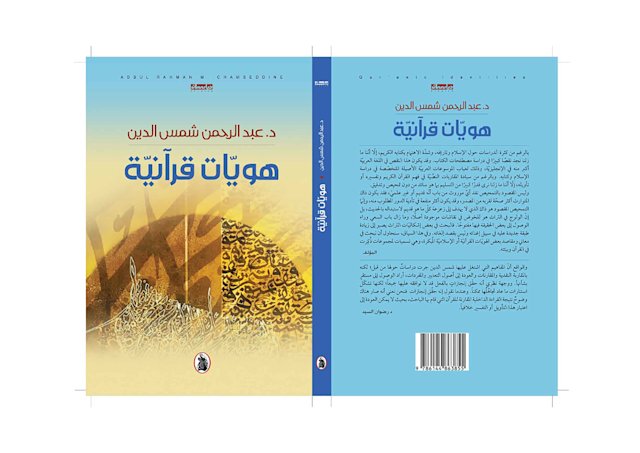
We are not using Classical or even Modern Standard Arabic in our daily lives. If we don’t find a better version of spoken Arabic that is closer to fusha, we will lose it completely.

